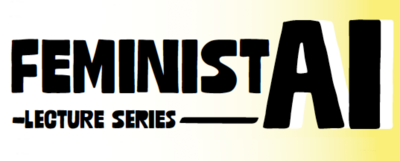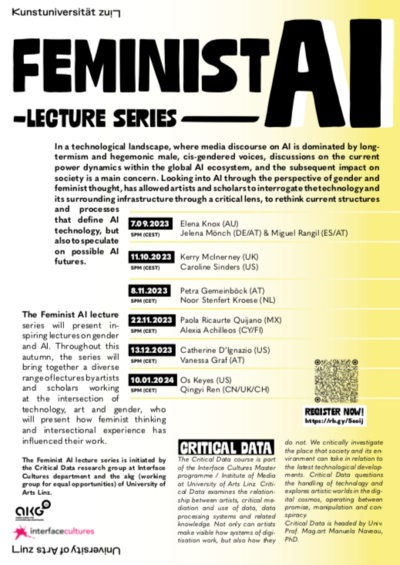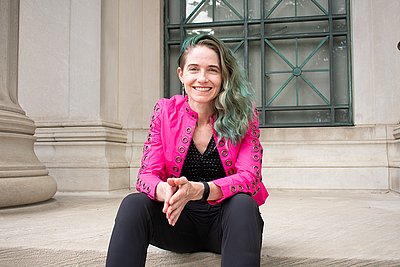Feminist AI Lecture Series #5
13. Dezember 2023, 17.00 Uhr ONLINE via Webex
Vortrag von Catherine D’Ignazio und Vanessa Graf im Rahmen der Reihe Feminist AI Lecture Series.
17.00 bis 17.15 Uhr, Intro by Manuela Naveau
17.15 bis 17.45 Uhr, Lecture Catherine DÌgnazio
17.45 bis 18.00 Uhr, short discussion
18.00 bis 18.30 Uhr, Lecture artistic research by Vanessa Graf
18.30 bis 19.00 Uhr, Q & A
Vanessa Graf (sie/ihr) ist Autorin und Forscherin am Critical Media Lab Basel, wo sie im Rahmen der MAKE/SENSE Graduate School an der FHNW Hochschule für Gestaltung und Kunst an ihrem PhD-Projekt Head in the Cloud arbeitet. Sie hat einen Bachelor in Politikwissenschaften von SciencesPo Paris und einen Master in Medien- und Kulturtheorie von der Kunstuni Linz. Derzeit ergänzt sie ihre Forschung mit einem Bachelor in Biologie (laufend) an der Universität Salzburg.
In ihrer Forschung interessiert sie sich für die Wechselwirkungen von (digitaler) Technologie mit Kultur und Ökologie, insbesondere durch die Vermittlung durch Narrative, Metaphern und soziotechnische Imaginationen. Ihre praxisorientierte Forschung stützt sich auf Ansätze aus der Medientheorie und -Ökologie, Anthropologie, Kunst, Literatur, Ökofeminismus und Informationstechnologie. Ihre Arbeiten wurden mehrfach ausgestellt, u. a. beim Ars Electronica Festival und der Biennale Warszawa, und sie hat zahlreiche Preise und Stipendien für ihre Forschung, künstlerische und literarische Arbeit erhalten.
www.vanessagraf.at">https://www.vanessagraf.at/>www.vanessagraf.at
Catherine D’Ignazio is an Associate Professor of Urban Science and Planning in the Department of Urban Studies and Planning at MIT. She is also Director of the Data + Feminism Lab which uses data and computational methods to work towards gender and racial justice, particularly in relation to space and place. D’Ignazio is a scholar, artist/designer and hacker mama who focuses on feminist technology, data literacy and civic engagement. She has run reproductive justice hackathons, designed global news recommendation systems, and created talking and tweeting water quality sculptures. With Rahul Bhargava, she built the platform Databasic.io, a suite of tools and activities to introduce newcomers to data science. Her book, Data Feminism (MIT Press 2020), co-authored with Lauren F. Klein, charts a course for more ethical and empowering data science practices. Since 2019, she has co-organized Data Against Feminicide, a participatory action-research-design project, with Isadora Cruxên, Silvana Fumega and Helena Suárez Val which includes AI tools for human rights data activists. D'Ignazio's forthcoming book, Counting Feminicide: Data Feminism in Action (MIT Press 2024), highlights how mainstream data science can learn a lot from the care and memory work of grassroots feminist activists across the Americas.
In Data Feminism (MIT Press, 2020), D’Ignazio and Klein established a set of principles for doing more just and equitable data science. Informed by the past several decades of intersectional feminist activism and critical thought, the principles of data feminism modeled how to examine and challenge power, rethink binaries and hierarchies, elevate emotion and embodiment, consider context, embrace pluralism, and make labor visible. How can these principles be applied to the current conversation about AI, its present harms, and its future possibilities? This talk will briefly summarize the principles of data feminism before moving to a set of examples that show how these principles can be applied–and extended–to our current technological landscape.
Die Vortragsreihe, initiert von der Forschungsgruppe Critical Data der Abteilung Interface Cultures und dem akg (Arbeitskreis für Gleichbehandlungsfragen) der Kunstuniversität Linz, präsentiert inspirierende Vorträge zu Gender und KI.
Lecture by Catherine D’Ignazio (US) and Vanessa Graf (AT) as part of the Feminist AI Lecture Series.
Vanessa Graf (she/her) is a writer and researcher at the Critical Media Lab Basel, where she is working on her PhD project Head in the Cloud as part of the MAKE/SENSE graduate school at FHNW Academy of Art and Design. She holds a Bachelor in Political Science from SciencesPo Paris and a Master in Media and Culture Studies from University of Art and Design Linz. Currently, she is supplementing her research with a Bachelor in Biology (ongoing) at University of Salzburg.
In her research, she is interested in the interactions of (digital) technology with culture and ecology, in particular as mediated by narratives, metaphors, and sociotechnical imaginaries. Her practice-based research draws on approaches and sources from media theory/ecology, anthropology, art, literature, ecofeminism, and information technology. Her work has been exhibited on several occasions, such as at the Ars Electronica Festival and Biennale Warszawa, and she has received numerous prizes and scholarships for both her research, artistic work, and literature.
www.vanessagraf.at
In a technological landscape, where media discourse on AI is dominated by longtermism and hegemonic male, cis-gendered voices, discussions on the current power dynamics within the global AI ecosystem, and the subsequent impact onsociety is a main concern. Looking into AI through the perspective of gender and feminist thought, has allowed artists and scholars to interrogate the technology and its surrounding infrastructure through a critical lens, to rethink current structures and processes that define AI technology, but also to speculateon possible AI futures.
The Feminist AI lecture series will present inspiring lectures on gender and AI. Throughout this autumn, the series will bring together a diverse range of lectures by artists and scholars working at the intersection of technology, art and gender, who will present how feminist thinking and intersectional experience has influenced their work.
The Feminist AI lecture series is initiated by the Critical Data research group at Interface Cultures department and the akg (workinggroup for equal opportunities) of University of Arts Linz.
Further date
10.01.2024 17PM (CEST)
Os Keyes (US)
Qingyi Ren (CN/UK/CH)
The Critical Data course is part of the Interface Cultures Masterprogramme / Institute of Media at University of Arts Linz. Critical Data examines the relationship between artists, critical mediation and use of data, dataprocessing systems and related knowledge. Not only can artists make visible how systems of digitisation work, but also how they do not. We critically investigate the place that society and its environment can take in relation to the latest technological developments. Critical Data questions the handling of technology and explores artistic worlds in the digitalcosmos, operating between promise, manipulation and conspiracy.
Critical Data is headed by Univ.Prof. Mag.art Manuela Naveau,PhD.



